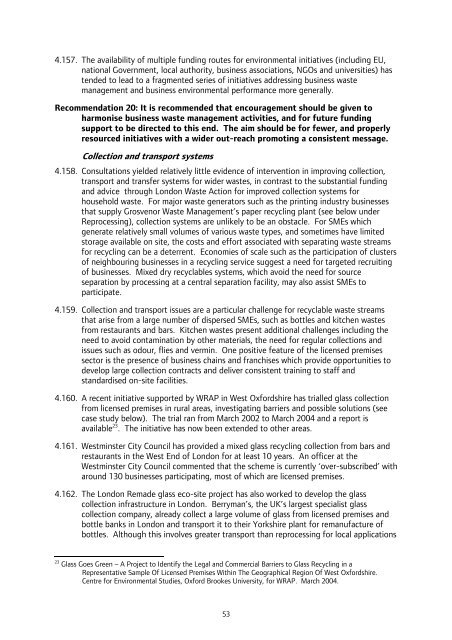London Wider Waste Strategy - London - Greater London Authority
London Wider Waste Strategy - London - Greater London Authority
London Wider Waste Strategy - London - Greater London Authority
You also want an ePaper? Increase the reach of your titles
YUMPU automatically turns print PDFs into web optimized ePapers that Google loves.
4.157. The availability of multiple funding routes for environmental initiatives (including EU,<br />
national Government, local authority, business associations, NGOs and universities) has<br />
tended to lead to a fragmented series of initiatives addressing business waste<br />
management and business environmental performance more generally.<br />
Recommendation 20: It is recommended that encouragement should be given to<br />
harmonise business waste management activities, and for future funding<br />
support to be directed to this end. The aim should be for fewer, and properly<br />
resourced initiatives with a wider out-reach promoting a consistent message.<br />
Collection and transport systems<br />
4.158. Consultations yielded relatively little evidence of intervention in improving collection,<br />
transport and transfer systems for wider wastes, in contrast to the substantial funding<br />
and advice through <strong>London</strong> <strong>Waste</strong> Action for improved collection systems for<br />
household waste. For major waste generators such as the printing industry businesses<br />
that supply Grosvenor <strong>Waste</strong> Management’s paper recycling plant (see below under<br />
Reprocessing), collection systems are unlikely to be an obstacle. For SMEs which<br />
generate relatively small volumes of various waste types, and sometimes have limited<br />
storage available on site, the costs and effort associated with separating waste streams<br />
for recycling can be a deterrent. Economies of scale such as the participation of clusters<br />
of neighbouring businesses in a recycling service suggest a need for targeted recruiting<br />
of businesses. Mixed dry recyclables systems, which avoid the need for source<br />
separation by processing at a central separation facility, may also assist SMEs to<br />
participate.<br />
4.159. Collection and transport issues are a particular challenge for recyclable waste streams<br />
that arise from a large number of dispersed SMEs, such as bottles and kitchen wastes<br />
from restaurants and bars. Kitchen wastes present additional challenges including the<br />
need to avoid contamination by other materials, the need for regular collections and<br />
issues such as odour, flies and vermin. One positive feature of the licensed premises<br />
sector is the presence of business chains and franchises which provide opportunities to<br />
develop large collection contracts and deliver consistent training to staff and<br />
standardised on-site facilities.<br />
4.160. A recent initiative supported by WRAP in West Oxfordshire has trialled glass collection<br />
from licensed premises in rural areas, investigating barriers and possible solutions (see<br />
case study below). The trial ran from March 2002 to March 2004 and a report is<br />
available 23 . The initiative has now been extended to other areas.<br />
4.161. Westminster City Council has provided a mixed glass recycling collection from bars and<br />
restaurants in the West End of <strong>London</strong> for at least 10 years. An officer at the<br />
Westminster City Council commented that the scheme is currently ‘over-subscribed’ with<br />
around 130 businesses participating, most of which are licensed premises.<br />
4.162. The <strong>London</strong> Remade glass eco-site project has also worked to develop the glass<br />
collection infrastructure in <strong>London</strong>. Berryman’s, the UK’s largest specialist glass<br />
collection company, already collect a large volume of glass from licensed premises and<br />
bottle banks in <strong>London</strong> and transport it to their Yorkshire plant for remanufacture of<br />
bottles. Although this involves greater transport than reprocessing for local applications<br />
23 Glass Goes Green – A Project to Identify the Legal and Commercial Barriers to Glass Recycling in a<br />
Representative Sample Of Licensed Premises Within The Geographical Region Of West Oxfordshire.<br />
Centre for Environmental Studies, Oxford Brookes University, for WRAP. March 2004.<br />
53
















